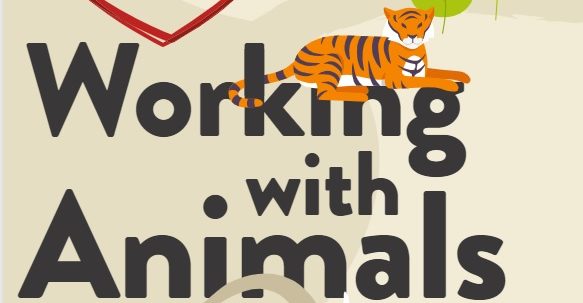Working with animals: Careers explored

We are a nation of animal lovers and growing up many children dream of becoming a vet or working in a zoo. As time goes on aspirations change, but what about those who made their dream a reality? In this issue, we speak to an animal keeper from Knowsley Safari and look at the different college and university pathways to a career in this sector.
To become a zookeeper, students will leave school and either enrol at a college or embark on an apprenticeship. College courses such as animal care, animal science or animal management are great starting points where you can achieve T-levels or Level 3 diplomas.
Myerscough College offer a two-year Level 3 Animal Management course which is the equivalent to an A-level. Students are able to develop a comprehensive understanding of animal management and biology which encompasses practical techniques, academic knowledge and technical skills. Requirements needed for this course are four GCSEs at Grade 9 to 4 and must include English language and mathematics or science.
Myerscough College has a number of locations around the northwest making it accessible for many. These sites are situated in Preston, Liverpool, Blackburn, Penrith or Walton Hall. Alternatively, for those who are going down the A-level route, studying biology and any other science related subjects is a must in this industry. From here you can head to university and obtain a degree.
Liverpool John Moores University offer a BSc (Hons) Zoology degree which is accredited by the Royal Society of Biology. It encompasses all aspects of biology, from biochemistry and cell biology to ecology and behaviour, and examines animals in the context of their evolution and their environment. During levels 5 and 6, students can go on to specialise in their own areas of interest via placements, projects and modules.
Alternatively, an apprenticeship is also a good option for those wanting to be hands on from the beginning. An intermediate apprenticeship in animal care and welfare may lead to a job as a trainee keeper within a zoo. More information about available courses can be found at apprenticeships.gov.uk.
Louise McKinnon, 28, is a senior keeper at Knowsley Safari and works within a team of 18. She always knew she wanted to work with animals from a young age. “I just didn’t know in what way,” she explains. “I was very keen to become a zoo vet but after looking into zoo keeping, I knew that role is exactly what I wanted to do.
“After school I went to SRUC (Scotland’s Rural College) and completed three years to gain a national certificate (NC), a higher national certificate (HNC) and a higher national diploma (HND).
“In my last year I had to compete a section of work experience and from there I started volunteering at Blair Drummond Safari Park and loved it. I was lucky enough to be given the opportunity to work on the large mammal team as part of maternity cover. After this I was given a permanent role.”
Louise stayed there for five years before joining Chester Zoo. After two and a half years, she joined Knowsley Safari where she works with ungulates – which means animals with hooves, for example rhinos, camels, giraffes, hippos and horses.
She adds: “My job involves everything to do with the animals so their daily health checks, training, enrichment, mixing or breeding. I also have to maintain the enclosures and report any issues to make sure me, my team and the animals are safe.”
As you can imagine, no two days are the same when you work in a safari or zoo as animals can be unpredictable creatures. Louise shares what an average day would like: “First thing I do is check all my animals are all ok. Then I feed out breakfast and get the rhinos out for the day and then it’s cleaning until lunch.
“After lunch I make up the feeds for PM and the next morning. Then I get the rhinos in for the night and feed everyone dinner. Last thing I do is check all my animals again and make sure everyone has enough food for the night and then I lock up the section.”
As the safari is a tourist attraction, staff work a rota-based system. For Louise, she works on a three-week rota where some weeks she gets one day off but the next week she will get two days off. She works from 8am until 5pm but in the winter she works shorter hours and in the summer the safari is open later.
The average salary for a zookeeper ranges from anywhere between £14,000 – £25,000 per annum, depending on location and experience. There is plenty of progression in this sector too and you could progress from keeper to team leader or head keeper.
As competition is tough, you may have to relocate to other areas of the country in order to work your way up to higher paid positions. Other areas of progression in later life could include moving into conservation research or education.
Working with animals can be an extremely rewarding career. Not only are you making a difference to the animals lives but you’re also developing a unique relationship that not many people can say they have formed.
Louise comments: “I love the bond you get with your animals. The animals know me and trust me daily to do everything for them from feeding to healthcare and training.”
Work experience is key in this industry as it is an in-demand career where lots of people are wanting to work with animals. Louise suggests: “Get as much work experience as you can from helping in a veterinary practice to dog walking. Zoo keeping is a hard job to get into as there are a lot of people wanting to become zookeepers but there are not a lot of zoo jobs.
“Anything that can make you stand out from the crowd helps so getting a degree in an animal-related subject will get you started but like with many jobs, the more you put into your career the more you’ll get out of it.”







